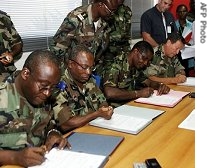2007年VOA标准英语-Ivory Coast Peacekeepers to Begin Pulling Out(在线收听)
Dakar
12 April 2007
International peacekeepers in Ivory Coast say they will withdraw slowly from the buffer zone that separates northern rebels and the Ivorian army. The process of reunifying divided Ivory Coast will begin with a ceremony Monday. VOA's Nico Colombant reports from our West Africa bureau in Dakar.
 |
| (L to R) General Amoussou Marcel, General Bakayoko Soumaila, head of New Forces rebels party, General Mangou Philippe, Ivory Coast chief of Staff and French general Antoine Lecerf sign an agreement, 11 Apr 2007 |
"It is a very important decision in the peace process in Cote d'Ivoire," he said. "Many of the [Ivorian] security forces will take over the security and then responsibility in this zone."
General Amoussou says the handover will take place in stages.
"Some months, we will have to support them because there is a lack of confidence and we will help them renew confidence among them," he said.
Rebels and the Ivorian army are setting up what they call an integrated military command center, following the latest peace deal reached in Burkina Faso.
The aim is to set up joint brigade centers, and joint rebel-army patrols in the buffer zone. French rapid reaction forces and U.N. troops are to withdraw over the next few months and set up observation posts along the dividing line between rebel zones and government run areas.
General Amoussou says this will allow U.N. troops to deploy elsewhere to help with other parts of the peace deal.
"We will redeploy our troops in the country to provide security all over the country, to secure the borders and also to deal with the key processes, the DDR (EDS: disarmament, demobilization and reinsertion of fighters), the identification, and then the elections. So for all these key processes there is a need for U.N. troops in the country," he said.
Despite previous failed peace deals, some of which were followed by renewed violence, General Amoussou says he believes in this one.
"There is no military risk, but let us say we have to remain vigilant," he said.
A French military official told VOA, the joint integrated command is not ready technically or logistically to ensure security in the buffer zone. But he says French troops will be ready to leave when there are guarantees security can be maintained in the ethnically-diverse and tense region.
Northern-based rebels have been fighting for more inclusive elections, in which more northerners can take part. Their leader, Guillaume Soro, was recently named prime minister in a new government, sharing power with President Laurent Gbagbo, whose term in office has already been extended twice due to delayed elections.